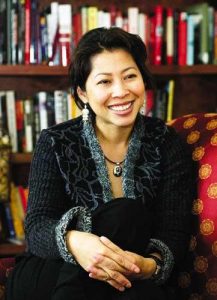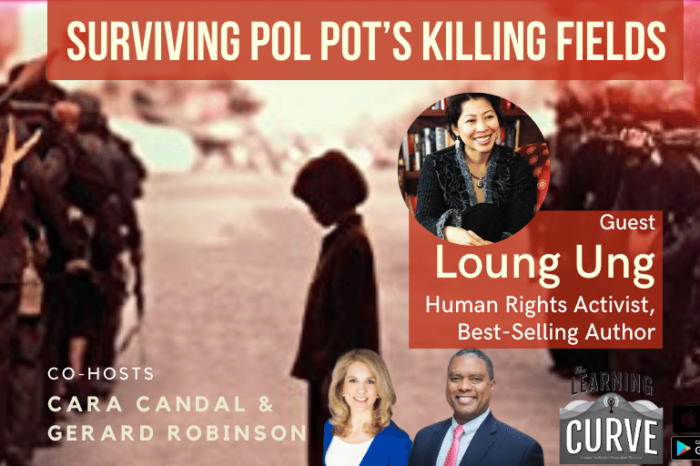Best-Selling, Netflix Author Loung Ung On Surviving Pol Pot’s Killing Fields
This week on “The Learning Curve,” Gerard and Cara talk with Loung Ung, a human-rights activist; the author of the bestselling books First They Killed My Father: A Daughter of Cambodia Remembers, Lucky Child, and Lulu in the Sky; and a co-screenwriter of the 2017 Netflix Original Movie, First They Killed My Father. Ms. Ung shares her experiences living through genocide under Pol Pot and the Khmer Rouge from 1975 to 1979, which resulted in the deaths of nearly a quarter of Cambodia’s population. Loung talks about working with Angelina Jolie on the film version of First They Killed My Father, and the role that documentaries like hers and the award-winning 1984 film, The Killing Fields, can play in portraying the human stories behind historic events. They explore Ms. Ung’s life in America, and the support she received from her secondary school teachers in Essex Junction, Vermont, her professors at St. Michael’s College, and from local and religious institutions. The episode concludes with a reading from Loung Ung’s memoir.
Stories of the Week: A new poll shows that nearly a third of parents may continue with remote learning after COVID. According to a new report, only one in six Indiana college students who study education actually join the teaching profession. How can we remove barriers to entry, especially among people of color?
Guest
 Loung Ung is a bestselling author, human-rights activist, and co-screenwriter of First They Killed My Father, the critically acclaimed 2017 Netflix Original Movie based on her memoir, that was produced and directed by Angelina Jolie and is now streaming on Netflix. Her other books include Lucky Child: A Daughter of Cambodia Reunites with the Sister She Left and Lulu in the Sky: A Daughter of Cambodia Finds Love, Healing, and Double Happiness. She has worked on various campaigns to end violence against women and the use of child soldiers, and to eradicate landmines globally. Among the publications, television, and radio shows she has been featured on are The New York Times, Washington Post, USA Today, People Magazine, CNN, Fresh Air with Terry Gross, and The Today Show. In addition, she has been the subject of documentary films broadcast by Nightline, German ARTE, and Japanese NHK. Loung has given hundreds of keynote addresses at numerous forums in the U.S. and internationally, including Stanford University, Dartmouth College, Phillips Academy, and the Women in the World Summit. Visit www.LoungUng.com and https://www.facebook.com/LoungUngAuthor for study guides and teaching videos.
Loung Ung is a bestselling author, human-rights activist, and co-screenwriter of First They Killed My Father, the critically acclaimed 2017 Netflix Original Movie based on her memoir, that was produced and directed by Angelina Jolie and is now streaming on Netflix. Her other books include Lucky Child: A Daughter of Cambodia Reunites with the Sister She Left and Lulu in the Sky: A Daughter of Cambodia Finds Love, Healing, and Double Happiness. She has worked on various campaigns to end violence against women and the use of child soldiers, and to eradicate landmines globally. Among the publications, television, and radio shows she has been featured on are The New York Times, Washington Post, USA Today, People Magazine, CNN, Fresh Air with Terry Gross, and The Today Show. In addition, she has been the subject of documentary films broadcast by Nightline, German ARTE, and Japanese NHK. Loung has given hundreds of keynote addresses at numerous forums in the U.S. and internationally, including Stanford University, Dartmouth College, Phillips Academy, and the Women in the World Summit. Visit www.LoungUng.com and https://www.facebook.com/LoungUngAuthor for study guides and teaching videos.
The next episode will air on Wednesday, March 17th, 2021 at 12 pm ET with guest, Dr. Kathryn Tempest, a Reader in Classics and Ancient History at the University of Roehampton in London, UK, and author of Cicero: Politics and Persuasion in Ancient Rome and Brutus: The Noble Conspirator.
Tweet of the Week:
.@IDEAschools ranks among top 5 across TX for providing meals to school children https://t.co/GBmMixGDOD @RepLloydDoggett @FilemonVela @MarcVeasey @ColinAllredTX @EddieBernice @RepSylviaGarcia @RepCuellar @JoaquinCastrotx @SheilaJacksonLe @RepEscobar @RepGonzalez @RepAlGreen
— Nina Rees (@Ninacharters) March 5, 2021
News Links:
Just 1 in 6 Indiana college students who study education become teachers, report finds
https://in.chalkbeat.org/2021/3/4/22312294/indiana-teacher-shortage-college-pipeline
NPR/Ipsos Poll: Nearly One-Third Of Parents May Stick With Remote Learning
Get Updates on Our Education Research
Recent Episodes:















